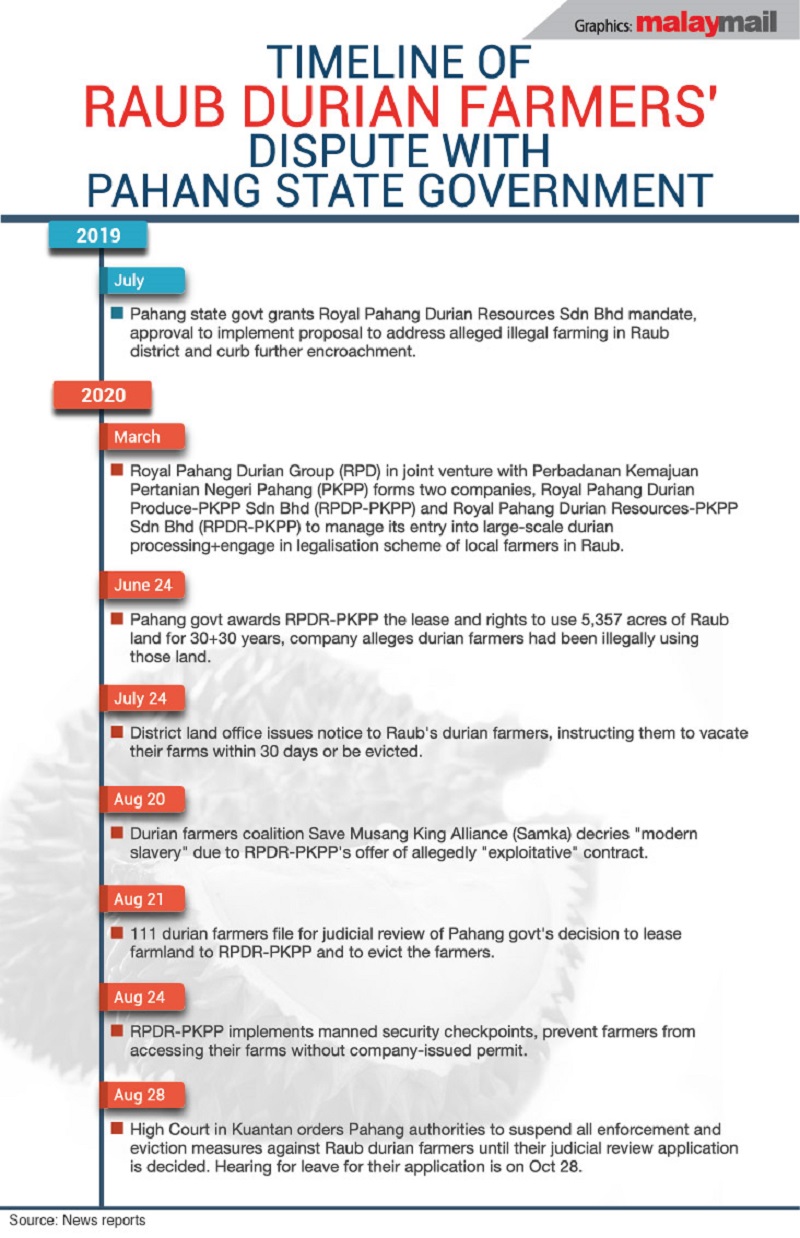PUTRAJAYA, Sept 2 ― Parti Putra Perkasa Malaysia (Putra) today urged the Pahang government to take back the thousands of hectares in Raub land being used to grow durians from farmers operating without licences and gazette them as Malay reserves instead.
Its vice-president Datuk Hamidah Osman said doing so could help reverse the diminishing acreage of Malay reserve land nationwide, which her party has been championing for.
“One of the crusades of Putra is to make sure that Malay reserve land is returned, which is supposed to be at 50 per cent [from the total land reserves] but today it is at only 12 per cent.
“So we ask these 4,400 hectares be converted into Malay reserve land and be given maybe to army veterans or whoever is qualified, because there are provisions that allow for this,” she told reporters after filing a report with the Malaysian Anti-Corruption Commission here.
Hamidah alleged possible corruption in the agricultural cultivation of the Raub lands by local farmers, many who do not have a licence to operate from the Pahang government.
When it was suggested to her that the cultivated land could be converted into forest reserves instead, Hamidah reiterated her stand on increasing Malay reserves in the country.
She noted the ongoing land dispute between the Raub farmers and the state is now with the courts, referring to the judicial review application challenging a recent eviction order.
“We do not want them to just be evicted, but also for action to be taken against them,” she said, referring to the farmers.
She said it was up to the Pahang government to decide whether it wanted to convert the cultivated farmland into Malay reserves or forest reserves as that was what the law provided.
Hamidah also disagreed with farmer group Save Musang King Alliance’s (Samka) claim that those accused of growing crops illegally on encroached land were actually awarded the plots in the 1970s as part of a restatement scheme by the now-defunct Pahang State Agricultural Enterprise Development Authority.
Samka had claimed the plots of land were gifted to these farmers more than four decades ago after they aided the government’s efforts against the communist insurgency, with commodities such as cocoa and rubber trees cultivated before they moved onto durians.
Hamidah today suggested that if these farmers were indeed the rightful land lease holders, there would be no need to escalate their issue challenging their eviction notices to the courts.
“My own father was a former policeman and we were awarded land, and we were given a land grant.
“So if they have the grant, they do not need to bring this matter to court; you produce your grant and there will be no problem.
“I am very sure there is no grant, because otherwise, why is there a need to bring the matter to court?” she asked.
Her comments and report to the MACC come amid a heated dispute between the farmers and the Pahang state government, as the latter seeks to reclaim the land occupied by the former for the large-scale cultivation of Malaysia’s iconic Musang King durian variety.
The farmers cried foul, accusing the state authorities of unfair treatment in their removal from the land that they have been cultivating for decades now that the Musang King durian industry has become a money spinner.
However, Royal Pahang Durian Resources PKPP Sdn Bhd, the private company empowered by the Pahang government to engage with the farmers in a land legalisation scheme, insisted it is offering a fair deal that will enable the planters to earn a decent profit.
The dispute has escalated into a legal battle between RPDR-PKPP and the farmers that have sought a judicial review and won a court order halting the eviction notices against them pending the hearing of their application on October 28.




















